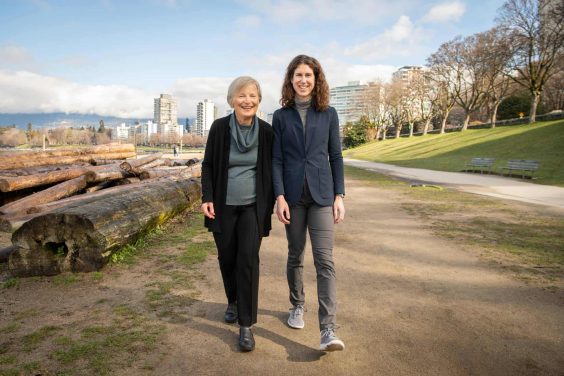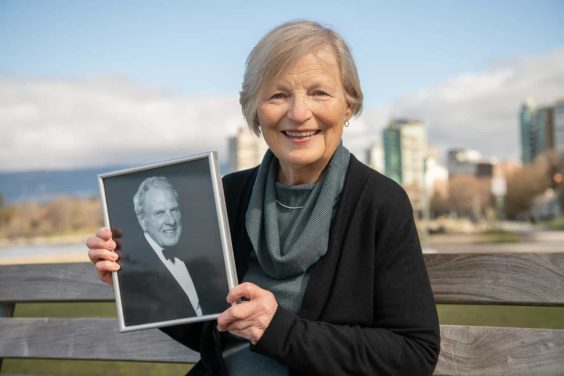People over 60 who have concerns about their memory or thinking skills may be eligible to receive care at a new St. Paul’s Hospital clinic.
Thanks to donor support to the St. Paul’s Foundation, the Early Intervention Memory Clinic (EIMC) is now open and accepting referrals. The clinic team – which includes geriatricians and occupational therapists – sees patients as soon as they start to notice changes in their memory and thinking.
“By identifying and reducing risks and encouraging beneficial lifestyle habits as early as possible, we can help patients optimize their brain health and maintain their quality of life,” says Dr. Philip Lee, Geriatrician and Physician Lead for EIMC.
As the population ages, more people are experiencing changes in their memory or thinking skills. While some changes are part of getting older, others could be a sign of a condition that will get worse over time.
“When subtle shifts in cognition have occurred and the cause is unknown, people can feel worried and anxious about what the future may hold. They may also try to hide these changes to avoid stigma,” says Annie Chen, Occupational Therapist. “The EIMC encourages people to share their concerns and experiences with a medical professional – early on, as the sooner a person takes action, the sooner they can learn strategies and habits to support their well-being.”
Patients can self-refer to the new clinic, but may need a doctor’s referral if a consult with a specialist is recommended.
Looking ahead, the vision is for the EIMC to be an integral part of the Shinozaki Family Centre for Healthy Aging, slated to open with the new St. Paul’s Hospital in 2027.
To learn more, check out the story below, published by the St. Paul’s Foundation in August 2023.

A compassionate revolution in early dementia care
Imagine you or a loved one is starting to lose your memory. You may be scared or embarrassed or both. There’s a good chance you’re trying to hide it. Now imagine a team of specialists is there to help you understand what’s happening, mitigate your symptoms, calm your anxiety, and even slow down the progression of your disease. How life-changing would that be?
At first, it was the small things. Ian Dowdeswell had trouble remembering the steps at the dance classes he and his wife, Frances, loved. Sometimes, he’d leave his wallet at home, or forget the name of a close friend.
“Ian was so well spoken. It was hard to believe anything was wrong. Everyone said it was just aging, and not to worry about it,” says Frances. Eight years later, during a routine follow-up at St. Paul’s Hospital, the couple relayed their concerns to their doctor. He listened and recommended they visit a geriatric clinic near their home in West Vancouver.
When the appointment finally took place – a year later – Ian was told he had mild cognitive impairment (MCI). He was put in line for a brain scan, which took another year. Finally, the couple received a diagnosis: Alzheimer’s disease. “When we asked them what we should do, they suggested puzzles and drop-in groups, and told us to come back in another year,” Frances remembers. Frances calls it “diagnose and dismiss.” And a team of physicians and health professionals at St. Paul’s wants to put an end to the practice.
Time is of the essence
At least 70,000 British Columbians are currently living with dementia. And while cognitive changes are not uncommon over age 65, people often delay getting help. When they do finally reach out, they often struggle to find meaningful assistance.
That’s where St. Paul’s is looking to move the dial.
“Many people are already in the moderate stages of dementia when we see them. By then, we’ve lost a lot of time,” says Dr. Martha Spencer, head of Geriatric Medicine at St. Paul’s.
Dr. Spencer and her team want to create an Early Intervention Memory Clinic (EIMC) to close gaps in care and bolster research into the early stages of cognitive impairment. Looking ahead, she envisions the clinic as an integral part of the Shinozaki Family Centre for Healthy Aging, slated to open with the new St. Paul’s Hospital in 2027.
“We want people to come to us as early as possible. We can wrap our services around them with a holistic team including physicians, occupational therapists, physiotherapists, and social workers,” says Dr. Spencer.” This way, patients and care partners can learn how to manage their new normal and do what they can to maintain quality of life and stave off further decline.”
Caring for caregivers is a unique and absolutely essential part of Dr. Spencer’s vision. The overwhelming majority of dementia caregivers are spouses and adult children. With little support or training, they spend some 26 hours a week caring for their loved one, navigating appointments, making medical decisions, and managing daily care. Of course, they’re also scrambling to manage their own lives and to assume the tasks their loved one once handled, like finances, grocery shopping and food prep, and household repairs.
It’s a lot. People who care for spouses with dementia are at higher risk for developing depression and are even more likely to develop dementia themselves.
For Frances, that threat felt very real. “You’re trying so hard to keep track of so many things,” she says. “I often feared I had Alzheimer’s, too.”
Early Intervention Memory Clinic is a beacon of hope

In the early stages of cognitive decline, people often feel angry, hopeless, and even ashamed. People need a safe and welcoming place to turn for education and coping strategies before they reach a point of crisis.
“If you have MCI, there’s a 10 per cent to 15 per cent chance you will later develop dementia. We want to work with that early group with an ambitious goal of preventing that,” says Dr. Spencer.
The EIMC would see people as soon as they start to notice signs of impairment. It would provide guidance on lifestyle changes to reduce the risk of further decline, such as exercise, diet, and social connections. And it would offer tools to reduce anxiety, improve sleep, and plan ahead for later stages of the disease.
Early cognitive changes can be subtle and make people question themselves or their partner. Lack of understanding can lead to more arguments. EIMC would help to reduce distress and optimize coping and communication. Care partners would be included in early education.
“We could also reduce vascular risk factors,” Dr. Spencer says. “Helping people control their high blood pressure and cholesterol with the right medications at the right dose makes a difference for brain health.”
The team’s vision also includes incorporating a robust research program into the clinic. For example, there aren’t any approved medications for early cognitive decline. Dr. Spencer wants to change that.
“Our model is unique and, from the get-go, we’ll start collecting data to share with other clinics in the province and around the country,” she says. “We’ll be able to provide virtual resources to patients and caregivers in remote and rural communities across BC. So no matter where you are, you will be able to benefit from this early intervention approach.”
The silver lining
Ian passed away in 2021. Today, Frances looks back with joy on their life together. “We were so lucky. We had a lot of magic in our lives.” And while she still remembers the frustration they experienced in the early days of Ian’s memory loss, she’s hopeful.
With the EIMC, families will have tools and strategies to help slow the pace of their disease. Patients and caregivers will feel confident and empowered right from the start.
Story by Kris Wallace and Melissa Edwards, St. Paul’s Foundation
link

